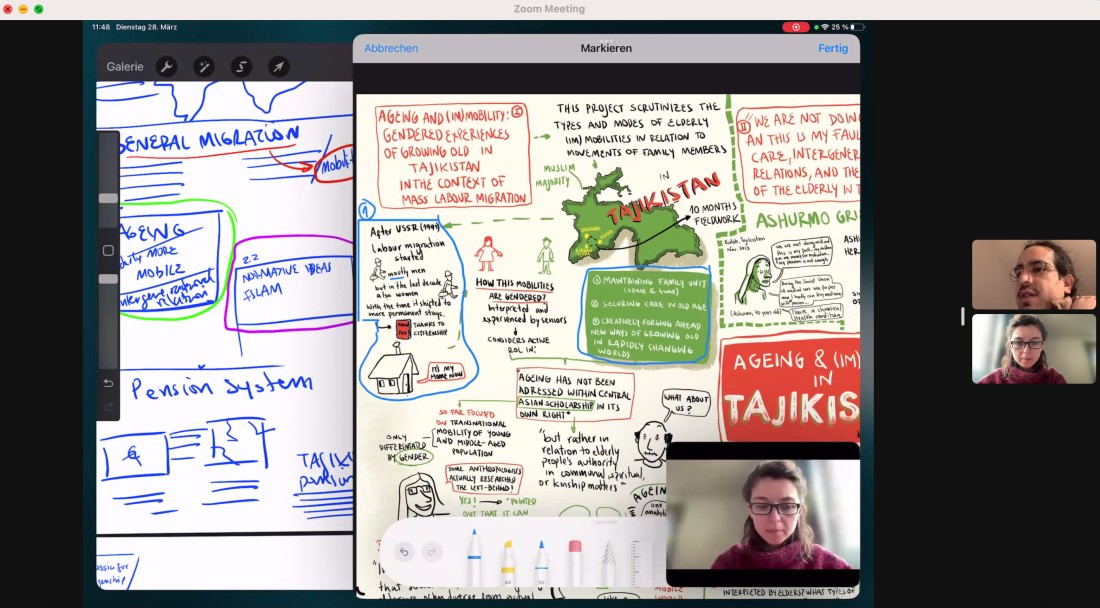The EASA Age and Generations Network is pleased to announce and cordially invite you to the 1st AGENET 2023 Webinar on multimodal ethnography and digital curating in ageing research. The webinar will host Daniel Miller (Anthropology of Smartphone and Smart Ageing, University College London), Megha Amrith, Victoria Sakti, Nele Wolter and Alvaro Martinez (Ageing in a Time of Mobility, Max Planck Institute for the Study of Religious and Ethnic Diversity) and Tomás Criado (Ageing Cities, Open University of Catalonia) as invited speakers and will be chaired by Swetlana Torno (AGENET co-convenor, Max Planck Institute for the Study of Religious and Ethnic Diversity).
Monday, 24th April 2023 | 11:00 – 13:00 CET / 10:00 – 12:00 BST | on Zoom
The webinar is free and open to all, but please register with Zhang@mmg.mpg.de to receive the Zoom link.
The webinar participants are invited to explore the project websites and outputs before the event by following integrated links above (click on project titles).
The image depicts work in progress between Álvaro Martínez and Swetlana Torno developing an infographic for the ‘Ageing in a Time of Mobility’ website based on a pre-created Mind Map (right image side).
Detailed webinar description:
This webinar focuses on visual and multimodal methods in the research on ageing, generations, and the life course and explores more-than-textual ways of disseminating insights of ethnographic work to academic and wider publics. The webinar will take the form of a roundtable discussion, in which the participants will speak about the interventions of their respective projects in ageing-related topics using collaborative approaches and a variety of media formats. Our goal is to look behind the scenes of multimodal ethnography and to shed light not only on the final output, but also on the creative process of experimenting with audio, visual, digital, multisensorial and interdisciplinary techniques in ethnographic practice and production. The discussion will elaborate on what multimodal ethnography means and will ask the following questions: how do more-than-textual formats transform anthropological research practice? What types of infrastructures are needed in multimodal work? And what challenges did the speakers face while working on their respective projects?
About the speakers:
Álvaro Martínez is a Berlin based anthropologist, designer and illustrator. Among his projects are the visualization and digitization of the research findings of the Max Planck Institute’s research group ‘Ageing in a Time of Mobility’. He is a member of the Public Anthropology working group of the DGSKA and was the Art Director of the multilingual project Medienwerkstatt Encounters. More info: www.alvaro-martinez.com
Daniel Miller is Professor of Anthropology at University College London. Relevant publications include 2017 The Comfort of People – a study of the social relations and communications of hospice patients in the UK. (With Pauline Garvey) 2021 Ageing with Smartphones in Ireland – a study of two Irish populations. (With 10 others) The Global Smartphone – beyond a youth technology – a comparative study of the consequences of smartphones for older people around the world. For our films see YouTube, UCL Why We Post and UCL ASSA.
Megha Amrith leads the ‘Ageing in a Time of Mobility’ Research Group at the Max Planck Institute for the Study of Religious and Ethnic Diversity in Göttingen. Her research interests are on migrant labour, care, ageing, inequalities, and belonging, with a current focus on ageing migrant domestic workers in Asia. She is author of Caring for Strangers: Filipino Medical Workers in Asia (NIAS Press, 2017) and is currently Editor of the journal Global Networks.
Nele Wolter is a Doctoral Fellow with the ‘Ageing in a Time of Mobility’ Research Group at the Max Planck Institute for the Study of Religious and Ethnic Diversity in Göttingen. She is also associated with the Department of Anthropology and African Studies at the University of Mainz. Her dissertation project focuses on how anglophone Cameroonians reshape their everyday lives in makeshift homes in the francophone part of the country after displacement by using ethnographic research methods.
Tomás Criado is Ramón y Cajal Senior Research Fellow at the Open University of Catalonia’s CareNet-IN3 group. His ethnographic and public engagement work focuses on different instances of relational, knowledge and material politics in a wide variety of settings where care is invoked as a mode of intervention: be it as a practice of articulating more or less enduring ecologies of support; or as a particular mode of technoscientific activism democratising knowledges, design practice and infrastructures. + info: www.tscriado.org| @tscriado
Victoria Sakti is a postdoctoral fellow at the Max Planck Institute for the Study of Religious and Ethnic Diversity. She has conducted long-term research in Timor-Leste and Indonesia and has published widely on ageing, forced displacement, violence, memory and emotions. She holds a PhD in social and cultural anthropology from the Free University of Berlin.

